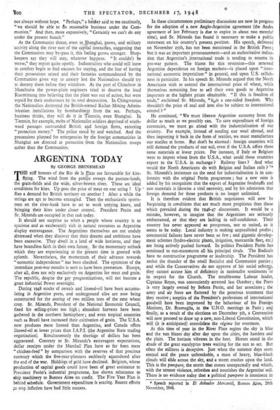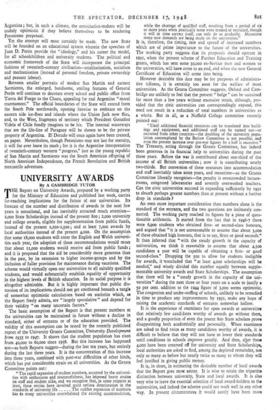ARGENTINA TODAY
By GEORGE BRINSMEAD TMITE stiff breezes of the Rio de la Vata are favourable for kite- flying. The wind from the pampa sweeps the pasture-lands, the grain-fields and the wide, silver-brown river. These are ideal conditions for kites. Up goes the price of meat on one string ! Up flies a demand for British territory on another ! After a while the strings are apt to become entangled. Then the enthusiastic sports- men on the river-bank have to set to work untying knots, and bringing their kites under closer control. President PerOn and Sr. Miranda are occupied in that task today.
It should not surprise us when a people whose country is as spacious and as exuberantly rich in natural resources as Argentina display extravagance. The Argentines themselves are not unduly distressed when they discover that their dreams and ambitions have been excessive. They dwell in a land of wide horizons, and they have boundless faith in their own future. So the momentary setback which they are experiencing at the present time is greeted with aplomb. Nevertheless, the momentum of their advance towards "economic independence" has been checked. The optimism of the immediate post-war months is seen to have been premature. Europe, after all, does not rely exclusively on Argentina for meat and grain. The republic, despite the gay prognostications, will not become a great industrial Power overnight.
During 1948 stocks of cereals and linseed-oil have been accumu- lating in Argentine ports, and underground silos are now being constructed for the storing of two million tons of the next wheat crop. Sr. Miranda, President of the National Economic Council, fixed his selling-prices too high ; abundant harvests have been gathered in the northern hemisphere ; and even tropical countries such as Brazil have increased their cultivation of grain. The U.S.A. now produces more linseed than Argentina, and Canada offers linseed-oil at lower prices than I.A.P.I. (the Argentine State trading organisation). Simultaneously the shortage of dollars has been aggravated. Contrary to Sr. Miranda's extravagant expectations, dollar receipts under the Marshall Plan have so far been mere "chicken-feed" by comparison with the reserves of that precious currency which the five-year-planners recklessly squandered after the end of the war. Holdings of gold have declined. Belgium, whose production of capital goods could have been of great assistance to President Peron's industrial programme has shown reluctance to ship machinery to Buenos Aires on credit The Five Year Plan is behind schedule. Government expenditure Is soaring. Recent efforts p-.) stop inflation have had little success.
In these circumstances preliminary discussions are now in progress for the adoption of a new Anglo-Argentine agreement (the Andes agreement of last February is due to expire in about two months' time), and Sr. Miranda has found it necessary to make a public statement on his country's present position. His speech, delivered on November 25th, has not been mentioned in the British Press ; but it was an important pronouncement—and an authoritative indica- tion that Argentina's ,international trade is tending to resume its pre-war pattern. The blame for this reversion—this renewed Argentine dependence on foreign markets—is placed upon "inter- national economic imperialism" in general, and upon U.S. selfish- ness in particular. In his speech Sr. Miranda argued that the North Americans wish to control the international price of wheat, while themselves remaining _free to sell their own goods to Argentine importers at the highest prices obtainable. "If this is freedom of trade," exclaimed Sr. Miranda, "iris a one-sided freedom. Why shouldn't the price of coal and iron also be subject to international control ? "
He continued, "We must liberate Argentine economy from the dollar as much as we possibly can. To save expenditure of foreign currencies, we must go ahead with the industrialisation of our country. For example, instead of sending our wool abroad, and then importing it back in the form of textiles, we must manufacture our textiles at home. But don't be alarmed: foreign countries will still demand the products of our soil, even if the U.S.A. offers those same materials at lower prices. For instance, if Italy or Belgium were to import wheat from the U.S.A., what could those countries export to the U.S.A. in exchange ? Railway lines ? And what would the North Americans do with Belgian and Italian rails ? "* Sr. Miranda's insistence on the need for industrialisation is in con- formity with the original Peron programme ; but a new note is added by his recognition that the export of Argentine foodstuffs and raw materials is likewise a vital necessity, and by his admission that foreign demand for those products is no longer unlimited.
It is therefore evident that British negotiators will now be bargaining in conditions that are much more propitious than those which prevailed during the 1946-47 discussions. It would be a mistake, however, to imagine that the Argentines are seriously embarrassed, or that they are lacking in self-confidence. Their country has never appeared so prosperous, nor so united, as it seems to be today. Local industry is making unparalleled profits ; commercial failures have never been so few ; and gigantic develop- ment schemes (hydro-electric plants, irrigation, mercantile fleet, etc.) are being actively pushed forward. In politics President PerOn has continued to out-manoeuvre all his principal rivals. The Radicals have no constructive programme or leadership. The President has stolen the thunder of the small Socialist and Communist parties ; and while the Conservatives do not approve of his social reforrw, they cannot accuse him of deficiency in nationalist sentiments or in respect for the Church. The troublesome Labour leader, Cipriano Reyes, was conveniently arrested last October ; the Press is very largely owned by Sefiora Peron, and her associates ; the army and air force are flattered by the generous treatment that they receive ; sceptics of the President's professions of international goodwill have been impressed by the behaviour of his Foreign Minister, Dr. Bramuglia, in the U.N.O. meetings in Paris ; ansl finally, as a result of the elections on December 5th, a Convention will now proceed to draw up a new, non-Liberal Constitution, which will (it is anticipated) consolidate the regime for evermore.
At this time of year in the River Plate region the sky is blue and the sun blazes day after day upon the cities, the hamlets and the plain. The horizon vibrates in the heat. Horses stand in the shade of the great eucalyptus trees waiting for the sun to set. But often the stillness is deceptive. Just when the summer days seem eternal and the peace unbreakable, a mass of heavy, blue-black clouds will slide across the sky, and a storm crashes upon the land. This is the pampero, the storm that comes unexpectedly and which, with the utmost violence, refreshes and nourishes the Argentine soil. There is no evidence today that a political pamper° is imminent in * Speech reported in El Avisador Mercantil, Buenos Aires, 26th November, 1948. Argentina ; but, in such a climate, the constitution-makers will be unduly optimistic if they believe themselves to be rendering Peronismo perpetual.
Yet the attempt will most certainly be made. The new State will be founded on an educational system wherein the speeches of Juan D. Peron provide the "ideology," and his career the model, for all schoolchildren and university students. The political and economic framework of the State will incorporate the principal fashions of twentieth-century civilisation—totalitarianism, socialism and mechanisation (instead of personal freedom, private ownership and peasant labour).
Between smaller portraits of modest San Martin and earnest Sarmiento, the enlarged, handsome, smiling features of General Per6n will continue to decorate every school and public office from Tierra del Fuego to the Chaco, appealing for real Argentine "moral rearmament." The official boundaries of the State will extend from the South Pole northwards, opening fanwise to embrace on the eastern side ice-floes and islands where the Union Jack now flies, and, to the West, fragments of territory which President Gonzalez Videla of Chile fondly imagines to be his. The internal waterways that are the life-line of Paraguay will be shown to be the private property of Argentina. El Dorado will once again have been created, on paper. Nevertheless, though Peronismo may not last for eternity, it will for ever leave its mark ; for it is the Argentine interpretation of twentieth-century western "progress," just as the young republic of San Martin and Sarmiento was the South American offspring of North American Independence, the French Revolution and British mercantile adventure.



































 Previous page
Previous page